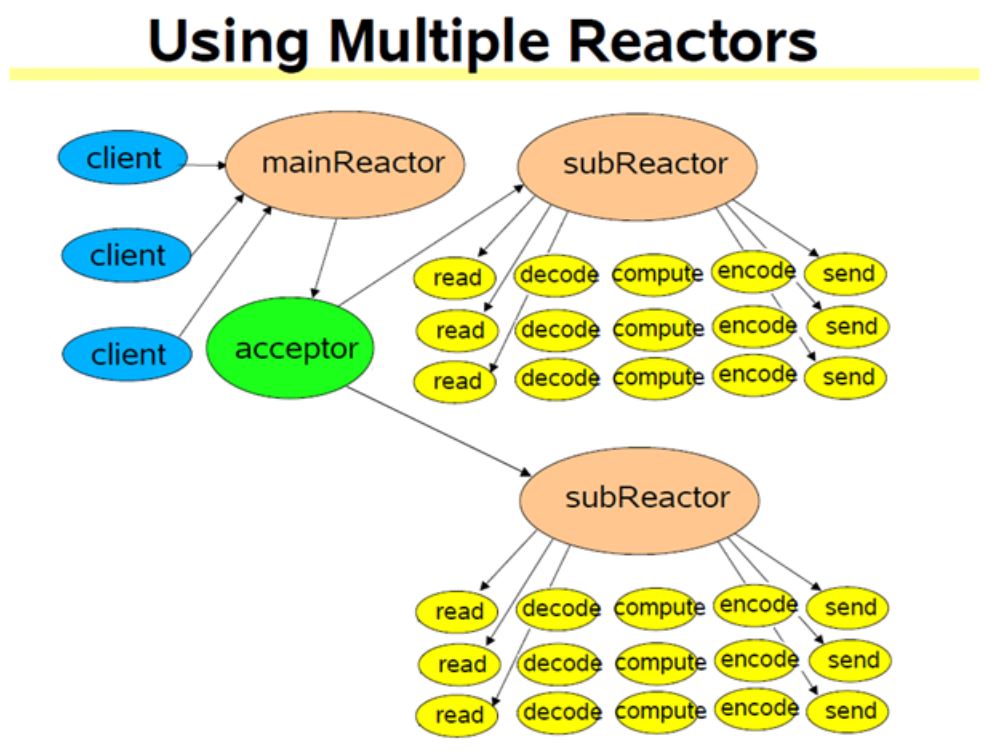muduo - EventLoopThread和EventLoopThreadPool剖析
# EventLoopThread
EventLoopThread是事件循环线程,包含一个Thread对象和一个EventLoop对象。在构造函数中,把EventLoopThread::threadFunc 注册到Thread对象中,在EventLoopThread::startLoop()函数中进行回调。
EventLoopThread的工作流程为:
- 在主线程创建EventLoopThread对象。
- 主线程调用EventLoopThread.start(),启动EventLoopThread中的线程(称为IO线程),而且主线程要等待IO线程创建完毕EventLoop对象。
- IO线程调用threadFunc创建EventLoop对象。通知主线程已经创建完毕。
- 主线程返回创建的EventLoop对象。
EventLoopThread类分析:
类定义如下:
class EventLoopThread : noncopyable
{
public:
typedef std::function<void(EventLoop*)> ThreadInitCallback;
EventLoopThread(const ThreadInitCallback& cb = ThreadInitCallback(),
const string& name = string());
~EventLoopThread();
EventLoop* startLoop();
private:
void threadFunc();
EventLoop* loop_ GUARDED_BY(mutex_);
bool exiting_;
Thread thread_;
MutexLock mutex_;
Condition cond_ GUARDED_BY(mutex_);
ThreadInitCallback callback_;
};
成员函数:
/********************************************************************
Description : 这个类专门创建一个线程用于执行Reactor的事件循环,当然
这只是一个辅助类,没有说一定要使用它,可以根据自己的情况进行选择,
你也可以不创建线程去执行事件循环,而在主线程中执行事件循环,
一切根据自己的需要。
*********************************************************************/
//构造函数
EventLoopThread::EventLoopThread(const ThreadInitCallback& cb,
const string& name)
: loop_(NULL),
exiting_(false),
thread_(std::bind(&EventLoopThread::threadFunc, this), name),
mutex_(),
cond_(mutex_),
callback_(cb)
{
}
//析构函数
EventLoopThread::~EventLoopThread()
{
exiting_ = true;
if (loop_ != NULL)
{
loop_->quit();
thread_.join();
}
}
// 启动一个EventLoop线程
EventLoop* EventLoopThread::startLoop()
{
assert(!thread_.started());
// 当前线程启动,调用threadFunc()
thread_.start();
EventLoop* loop = NULL;
{
MutexLockGuard lock(mutex_);
while (loop_ == NULL)
{
// 等待创建好当前IO线程
cond_.wait();
}
loop = loop_;
}
return loop;
}
void EventLoopThread::threadFunc()
{
EventLoop loop;
// 如果有初始化函数,就先调用初始化函数
if (callback_)
{
callback_(&loop);
}
{
MutexLockGuard lock(mutex_);
// loop_指针指向了一个栈上的对象,threadFunc函数退出之后。这个指针就失效了
// threadFunc函数退出,就意味着线程退出了,EventLoopThread对象也就没有存在的价值了。
// 因而不会有什么大的问题
loop_ = &loop;
// 通知startLoop线程已经启动完毕
cond_.notify();
}
// 事件循环,直到EventLoopThread析构。此后不再使用loop_访问EventLoop了。
loop.loop();
MutexLockGuard lock(mutex_);
loop_ = NULL;
}
测试程序:
#include <muduo/net/EventLoop.h>
#include <muduo/net/EventLoopThread.h>
#include <stdio.h>
using namespace muduo;
using namespace muduo::net;
void runInThread()
{
printf("runInThread(): pid = %d, tid = %d\n",
getpid(), CurrentThread::tid());
}
int main()
{
printf("main(): pid = %d, tid = %d\n",
getpid(), CurrentThread::tid());
EventLoopThread loopThread;
EventLoop* loop = loopThread.startLoop();
// 异步调用runInThread,即将runInThread加入到loop对象所在IO线程,让该IO线程运行
loop->runInLoop(runInThread);
sleep(1);
// runAfter内部也调用了runInLoop。所以这里也是异步调用
loop->runAfter(2, runInThread);
sleep(3);
loop->quit();
printf("exit main().\n");
}
执行结果:
[root@192 EventLoopThread]# g++ runInLoopThreadTest.cpp -o runInLoopThreadTest -I /home/muduo/muduo-master -L/home/muduo/build/release-cpp11/lib/ -lmuduo_net -lmuduo_base -lpthread
[root@192 EventLoopThread]# ./runInLoopThreadTest
main(): pid = 2399, tid = 2399
runInThread(): pid = 2399, tid = 2400
runInThread(): pid = 2399, tid = 2400
exit main().
[root@192 EventLoopThread]#
对于上述调用程序进行分析:
主线程调用 loop->runInLoop(runInThread); 因为主线程(不是IO线程)调用runInLoop。 故进一步调用queueInLoop() 将runInThread 加入到队列,然后wakeup() IO线程。IO线程在doPendingFunctors() 中取loop->runAfter() 要唤醒一下,此时仅仅是运行runAfter() 加入了一个2s的定时器, 2s超时。timerfd_ 可读,先handleRead()一下然后运行回调函数runInThread()。
那为什么exit main() 之后wakeupFd_ 还会有可读事件呢?那是由于EventLoopThead 栈上对象析构,在析构函数内 loop_ ->quit(), 因为不是在IO线程调用quit(),故也须要唤醒一下。IO线程才干从poll 返回,这样再次循环推断 while (!quit_) 就能退出IO线程。
# EventLoopThreadPool
muduo的线程模型:

muduo的思想是EventLoop + thread pool。为了更方便使用,将EventLoopThread做了封装。main reactor能够创建sub reactor,并发一些任务分发到sub reactor中去。EventLoopThreadPool的思想比较简单,用一个main reactor创建EventLoopThreadPool。在EventLoopThreadPool中将EventLoop和Thread绑定,能够返回EventLoop对象来使用EventLoopThreadPool中的Thread。
EventLoopThreadPool 是一个线程池,只不过该线程池有一点特殊,该线程池中的每一个线程都要执行EventLoop进行文件描述符的监听。此时一个线程用于管理分配线程池中的EventLoop,如果线程池为空,主线程的EventLoop用于监听所有的文件描述符。
EventLoopThreadPool类分析:
类定义如下:
class EventLoopThreadPool : noncopyable
{
public:
typedef std::function<void(EventLoop*)> ThreadInitCallback;
EventLoopThreadPool(EventLoop* baseLoop, const string& nameArg);
~EventLoopThreadPool();
void setThreadNum(int numThreads) { numThreads_ = numThreads; }
void start(const ThreadInitCallback& cb = ThreadInitCallback());
// valid after calling start()
/// round-robin
EventLoop* getNextLoop();
/// with the same hash code, it will always return the same EventLoop
EventLoop* getLoopForHash(size_t hashCode);
std::vector<EventLoop*> getAllLoops();
bool started() const
{ return started_; }
const string& name() const
{ return name_; }
private:
EventLoop* baseLoop_; //线程池类用于服务端,baseLoop_用于接收新连接,线程池用于处理这些新连接的IO操作。与Acceptor所属EventLoop同样
string name_;
bool started_; //开始标志
int numThreads_; // 线程数
int next_; // 新连接到来。所选择的EventLoop对象下标
std::vector<std::unique_ptr<EventLoopThread>> threads_; // IO线程列表
std::vector<EventLoop*> loops_; // EventLoop列表
};
成员函数分析:
构造与析构
EventLoopThreadPool::EventLoopThreadPool(EventLoop* baseLoop, const string& nameArg)
: baseLoop_(baseLoop),
name_(nameArg),
started_(false),
numThreads_(0),
next_(0)
{
}
EventLoopThreadPool::~EventLoopThreadPool()
{
// Don't delete loop, it's stack variable
}
开启线程池
void EventLoopThreadPool::start(const ThreadInitCallback& cb)
{
assert(!started_);
baseLoop_->assertInLoopThread();
started_ = true;
//创建numThreads_个事件循环器,numThreads_通过setThreadNum函数进行设置
//一般调用时先setThreadNum(),然后start().
// void setThreadNum(int numThreads) { numThreads_ = numThreads; } 设置线程数量
// void start(const ThreadInitCallback& cb = ThreadInitCallback()); 设置初始回调函数
for (int i = 0; i < numThreads_; ++i)
{
char buf[name_.size() + 32];
snprintf(buf, sizeof buf, "%s%d", name_.c_str(), i);
////创建一个EventLoopThread 对象
EventLoopThread* t = new EventLoopThread(cb, buf);
threads_.push_back(std::unique_ptr<EventLoopThread>(t));
//事件循环器开始执行,如果此时需要监听的文件描述符的数量小于线程个数
//其余的线程会进入睡眠状态
loops_.push_back(t->startLoop());
}
//线程池的个数为0,则主线程开始监听套接字
if (numThreads_ == 0 && cb)
{
cb(baseLoop_);
}
}
getNextLoop 采用轮询的方式分配EventLoop
//循环获取下一个线程池的loop,保证各IO线程上执行的IO操作基本负载均衡
EventLoop* EventLoopThreadPool::getNextLoop()
{
baseLoop_->assertInLoopThread();
assert(started_);
EventLoop* loop = baseLoop_;
//如果线程池为空,返回主线程的EventLoop
if (!loops_.empty())
{
// round-robin
loop = loops_[next_];
++next_;
//循环获取,如果next_的值大于了loops_.size(), 从第一个开始获取
if (implicit_cast<size_t>(next_) >= loops_.size())
{
next_ = 0;
}
}
return loop;
}
getLoopForHash采用hash方式分配EventLoop
EventLoop* EventLoopThreadPool::getLoopForHash(size_t hashCode)
{
baseLoop_->assertInLoopThread();
EventLoop* loop = baseLoop_;
if (!loops_.empty())
{
loop = loops_[hashCode % loops_.size()];////hash 的方式获取EventLoop 事件循环器
}
return loop;
}
getAllLoops 返回所有的EventLoop
std::vector<EventLoop*> EventLoopThreadPool::getAllLoops()
{
baseLoop_->assertInLoopThread();
assert(started_);
//如果线程池为空
if (loops_.empty())
{
//将主线程的EventLoop 返回
return std::vector<EventLoop*>(1, baseLoop_);
}
else
{
//否则,返回线程池中的EventLoop
return loops_;
}
}
实际使用过程中,EventLoopThreadPool是嵌入TcpServer作为类的一个成员来使用:
TcpServer::TcpServer(EventLoop* loop,
const InetAddress& listenAddr,
const string& nameArg,
Option option)
: loop_(CHECK_NOTNULL(loop)),
ipPort_(listenAddr.toIpPort()),
name_(nameArg),
acceptor_(new Acceptor(loop, listenAddr, option == kReusePort)),
threadPool_(new EventLoopThreadPool(loop, name_)), //创建线程池
connectionCallback_(defaultConnectionCallback),
messageCallback_(defaultMessageCallback),
nextConnId_(1)
{
acceptor_->setNewConnectionCallback(
std::bind(&TcpServer::newConnection, this, _1, _2));
}
void TcpServer::setThreadNum(int numThreads)
{
assert(0 <= numThreads);
threadPool_->setThreadNum(numThreads);//设置线程数量
}
void TcpServer::setThreadNum(int numThreads)
{
assert(0 <= numThreads);
threadPool_->setThreadNum(numThreads);
}
void TcpServer::start()
{
if (started_.getAndSet(1) == 0)
{
threadPool_->start(threadInitCallback_);//线程池启动
assert(!acceptor_->listening());
loop_->runInLoop(
std::bind(&Acceptor::listen, get_pointer(acceptor_)));
}
}
void TcpServer::newConnection(int sockfd, const InetAddress& peerAddr)
{
loop_->assertInLoopThread();
EventLoop* ioLoop = threadPool_->getNextLoop();//获取下一个Loop,进行使用
......
}
